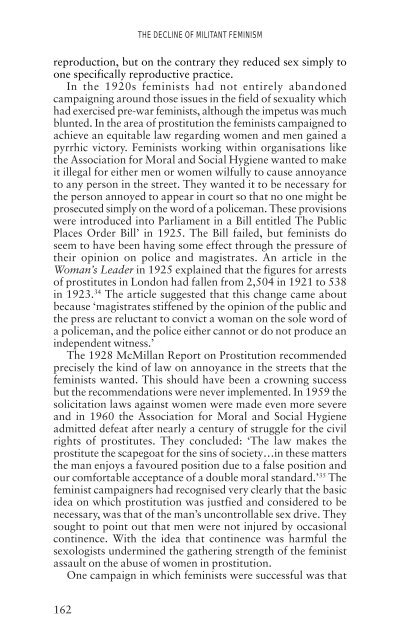The Spinster and Her Enemies - Feminish
The Spinster and Her Enemies - Feminish
The Spinster and Her Enemies - Feminish
Create successful ePaper yourself
Turn your PDF publications into a flip-book with our unique Google optimized e-Paper software.
THE DECLINE OF MILITANT FEMINISM<br />
reproduction, but on the contrary they reduced sex simply to<br />
one specifically reproductive practice.<br />
In the 1920s feminists had not entirely ab<strong>and</strong>oned<br />
campaigning around those issues in the field of sexuality which<br />
had exercised pre-war feminists, although the impetus was much<br />
blunted. In the area of prostitution the feminists campaigned to<br />
achieve an equitable law regarding women <strong>and</strong> men gained a<br />
pyrrhic victory. Feminists working within organisations like<br />
the Association for Moral <strong>and</strong> Social Hygiene wanted to make<br />
it illegal for either men or women wilfully to cause annoyance<br />
to any person in the street. <strong>The</strong>y wanted it to be necessary for<br />
the person annoyed to appear in court so that no one might be<br />
prosecuted simply on the word of a policeman. <strong>The</strong>se provisions<br />
were introduced into Parliament in a Bill entitled <strong>The</strong> Public<br />
Places Order Bill’ in 1925. <strong>The</strong> Bill failed, but feminists do<br />
seem to have been having some effect through the pressure of<br />
their opinion on police <strong>and</strong> magistrates. An article in the<br />
Woman’s Leader in 1925 explained that the figures for arrests<br />
of prostitutes in London had fallen from 2,504 in 1921 to 538<br />
in 1923. 34 <strong>The</strong> article suggested that this change came about<br />
because ‘magistrates stiffened by the opinion of the public <strong>and</strong><br />
the press are reluctant to convict a woman on the sole word of<br />
a policeman, <strong>and</strong> the police either cannot or do not produce an<br />
independent witness.’<br />
<strong>The</strong> 1928 McMillan Report on Prostitution recommended<br />
precisely the kind of law on annoyance in the streets that the<br />
feminists wanted. This should have been a crowning success<br />
but the recommendations were never implemented. In 1959 the<br />
solicitation laws against women were made even more severe<br />
<strong>and</strong> in 1960 the Association for Moral <strong>and</strong> Social Hygiene<br />
admitted defeat after nearly a century of struggle for the civil<br />
rights of prostitutes. <strong>The</strong>y concluded: ‘<strong>The</strong> law makes the<br />
prostitute the scapegoat for the sins of society…in these matters<br />
the man enjoys a favoured position due to a false position <strong>and</strong><br />
our comfortable acceptance of a double moral st<strong>and</strong>ard.’ 35 <strong>The</strong><br />
feminist campaigners had recognised very clearly that the basic<br />
idea on which prostitution was justfied <strong>and</strong> considered to be<br />
necessary, was that of the man’s uncontrollable sex drive. <strong>The</strong>y<br />
sought to point out that men were not injured by occasional<br />
continence. With the idea that continence was harmful the<br />
sexologists undermined the gathering strength of the feminist<br />
assault on the abuse of women in prostitution.<br />
One campaign in which feminists were successful was that<br />
162

















